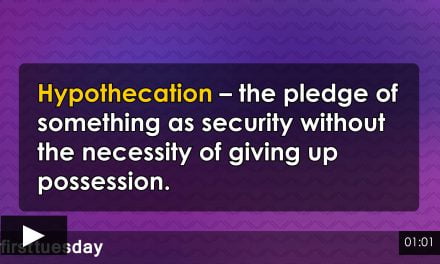Our proposal: We propose California grant residential tenants protection against liability for the accrual of unpaid rents exceeding their security deposit, while empowering landlords to collect a security deposit equal to three month’s rent to cover rent accruing while they diligently process notices to pay, to quit, and to evict by an unlawful detainer (UD) action and recover possession.
Why: Like defaulting owner-occupants who receive anti-deficiency protection against their purchase-money mortgage debt for housing, limiting the mortgage holder’s remedy solely to the value of the property when the owner-occupant fails to make monthly payments, defaulting tenants also need equal-type protection for their leasing arrangement debt for housing, limiting the landlord’s remedy solely to recovery of possession of the property when the tenant fails to make monthly payments.
Here, when a tenant becomes a non-paying tenant, the landlord, unlike the mortgage holder against a non-paying owner-occupant, has the tenant’s security deposit as security for recovery of accruing unpaid rent.
To equalize the risk of loss for the landlord under an anti-accrual rule, a sufficient security deposit is one that covers the landlord’s losses accrued during a diligent effort by management to promptly serve the tenant with all notices required to evict for failure to pay rent. A lack of diligence in serving documents means an increase in the landlord’s risk of loss, the duty to mitigate losses by re-renting already existing in landlord-tenant law.
Homeowners and tenants have common ground
As it stands currently, a landlord with a non-paying tenant may first deduct the cost of unpaid rent from the tenant’s security deposit. However, any additional unpaid rent may be pursued in small claims court. [Calif. Civil Code §§1950.5(a)(4); 1950.5(n)]
There is common ground between residential tenants/landlords and homeowners/lenders, as both tenants and mortgaged homeowners are being lent something — either a property to occupy or money to purchase property to occupy. In terms of shelter, the different is a paperwork technicality, even when the owner pays off the mortgage or the tenant exercises an option to buy.
And yet, anti-deficiency laws have been on the books in California since the 1930s when homeowners were struggling to make ends meet during the Great Depression and were hit with money judgement awards to their mortgage holders. However, there are no equivalent anti-deficiency or anti-accrual laws in place for renters.
Consider a homeowner who purchases at the height of the market with a mortgage secured by their primary residence. After the market cools off and home values drop, they lose their job and are no longer able to make mortgage payments. They default on their housing payments and the lender forecloses, repossessing the property. However, the value of the foreclosed property is lower than the remaining mortgage debt (a cyclically familiar condition called negative equity). To make up the difference, is the lender able to collect additional money from the foreclosed homeowner?
No. Due to California’s anti-deficiency protections on nonrecourse mortgages — purchase-money debt incurred for housing — the collection of any underpaid amount is limited by anti-deficiency rules to the value of the property at the time of payoff, in this case, the foreclosure sale. [California Code of Civil Procedure §580b(a)]
Of course, the homeowner loses any investments they made in the property, including their original down payment. But all missed (unpaid) mortgage payments accrued until up to the time of the foreclosure sale are essentially forgiven since the lender cannot enforce collection.
Contrast this owner-occupant reality with tenant-occupants who lose their job and stop paying rent. On top of these tenants losing their initial investment in securing shelter — their security deposit and any tenant improvements (TIs) — they will risk being further pursued by the landlord to a money judgment for the property’s rental value during the tenant’s occupancy (or longer, subject to landlord mitigation of their losses), which a non-diligent landlord allows to accrue before re-renting the property.
Anti-accrual for renters
firsttuesday proposes to grant residential renters similar protections as homeowners. In the case of a defaulting homeowner, they have the option to walk away from their property prior to repossession by the mortgage holder without fear of recourse for money owed, beyond losing the right to occupy the property. But renters have no such luxury when it comes to providing shelter for themselves and their household.
During the early months of 2020, over 2.7 million Californians lost their jobs. We were in a recession worsened by the coronavirus pandemic. Going into 2021, 1.35 million — a full half of those who lost jobs — are still without work in California. The majority of job losses took place in low-paying industries, primarily those who rent their shelter since they cannot generally qualify to own it.
With millions out of work, the impact on tenants’ ability to pay rent — and, likewise, landlords’ ability to cover their ownership costs — has been devastating. At the end of 2020, a whopping 20% of tenants were behind on their rent in California and 18% were behind nationwide, according to the U.S. Census. For reference, 15% of California’s mortgaged homeowners were behind on their payments, compared to 11% nationwide.
Since we’re in the middle of a global pandemic, the state initiated an eviction moratorium to keep individuals housed, an effort needed to contain the spread of the deadly coronavirus (COVID-19). This moratorium was recently extended through June 30, 2021. This means many tenants have occupied their units for months, accumulating thousands and thousands of dollars in unpaid rent. Without income to pay the landlord back, these tenants eye the moratorium’s expiration with dread.
Related page:
When the moratorium ends, what then?
Along with the recent extension, the new law gives landlords access to federal funds to cover much of the rent tenants have missed. However, only landlords of low-income tenants — who earn 80% or less of the area’s median income — are eligible, and even then, they will only receive the equivalent of 80% of the missed rents, needing to make up the 20% difference on their own.
Of course, the pandemic and recession of 2020-2021 have caused huge abnormalities in the normal flow of rental housing. Still, the many months of unpaid rent on landlords’ balance sheets only highlights the need for a sustainable, long-term solution to ordinary rent obligations for residential property. After all, when a landlord eventually is able to evict a tenant and take them to small claims court to recover unpaid rent, a recovery of costs is not always successful, particularly when the tenant doesn’t have access to funds or simply relocates out of the county.
Our proposal is to eliminate the ability of residential landlords to take tenants to small claims court. They have no need for this crutch to fall back on as, in a normal market, they have the ability to diligently deliver timely notices for a UD action and hold the tenant’s security deposit to cover the unpaid rent. When the diligent landlord timely acts to evict the non-paying tenant, they regain possession of the property quickly – in less than three months. Like a mortgage holder who has repossessed a home and now needs a buyer, the landlord’s property is returned to the marketplace to locate a tenant – all about market conditions every property is subject to.
Related page:
















Unbelievable. Previous posters outline the deficiencies of your proposal. The risks and realities faced by commercial lenders are not the same as those faced by rental property owners.
I am so disappointed in your position regarding landlords, tenants and security deposits. The amount of a security deposit is strictly enforced and not an arbitrary amount. By the current laws a landlord cannot just charge any amount they feel is appropriate for their property. A security deposit is not intended just for covering rent loss it also covers damage to the property which in some cases can be extensive. It is not a landlord’s job to financially support a tenant regardless of the reason and a tenant should be responsible to pay back the amount of rent owed or the amount mutually decided by the tenant and the landlord. A tenant can move out at any time and just disappear owing the landlord money and having created a mess in the landlord’s property which will need to be paid for by the landlord. The tenant will generally suffer no consequences to their credit and just be able to move on. A landlord does not have that flexibility nor can a landlord collect sufficient funds in advance to properly cover themselves.
The previous responses are spot on. Your one sided approach is clearly tenant centric and ignores the realities of the rental world. By the way, a homeowner only avoids a deficiency judgement is when there is a non judicial foreclosure. Why didn’t you suggest an expedited non judicial eviction procedure to go along with your “proposal”. I think we all know the reason.
This proposal is completely unworkable. You simply cannot compare the situation of homeowners to the situation of renters. Homeowners have anti-deficiency protections because a house value’s fluctuation could end up saddling a homeowner with hundreds of thousands of dollars of a deficiency judgment due to a market swing. Homeowners also generally have to pay a substantial down payment and closing costs, which means they have some skin in the game, and that discourages them from walking away from their investments unless they really, really need to.
Tenants are in a whole different boat. They don’t have to pay substantial down payments and closing costs, so they typically have very little skin in the game. Nor could most of them afford that, otherwise they would be buying, not renting. I usually charge one month’s rent as a security deposit, and even that is difficult for some tenants to scrape together, especially as they’re moving from a different place and having to pay for moving costs. If it were legal to accept 3 months’ worth of rent as a security deposit, I still wouldn’t be able to do it, as a practical matter. And the tenants who have the worst credit are going to be the ones who will most often be required to pay the maximum security deposit before a landlord will rent to them. If they can’t scrape together that large of a security deposit, they may find it even more difficult to find housing AT ALL.
Changing the law as you propose will lead to this situation, IMO: tenants will still be generally paying a month’s security deposit, and that’s it. Landlords who demand 2-3 months’ worth of security deposit won’t be able to rent their apartments, other than to the worst of the worst, and they will probably regret it. Tenants will be more inclined to damage property and/or game the system and walk away owing huge amounts of rent, knowing that their landlord can’t chase them for it afterward. Landlords will get hosed, and if it happens enough times, landlords will either significantly restrict who they will rent to based on creditworthiness and ability to pay a huge security deposit, meaning that low-income people or people with bad credit won’t be able to get housing, period. Moreover, landlords will be more inclined to pull rental properties off the market, which will mean less available rental stock. Lose-lose-lose, all around.
Also, your proposal hinges on some completely false assumptions. You assume that by promptly serving notices and filing a UD action, a landlord won’t ever be out of pocket for too much more than the security deposit amount anyway. You clearly have very limited experience with UD actions. Pre-COVID, evictions would take about 2 months, start to finish. And that’s assuming timely notice is given, the lawsuit is promptly filed, the tenant is personally served with the lawsuit in an average amount of time, that the clerk fairly promptly issues the writ of possession, etc. A tenant could substantially delay all of that by ducking service, responding to the complaint with B.S. allegations of uninhabitability, filing for bankruptcy, demanding a jury trial, etc. A really sneaky tenant could easily delay an eviction by 6-12 months if they did some homework. Additionally, you failed to consider entirely that UD actions were suspended for a significant amount of time during COVID, and they are STILL being suspended. We’re coming up on about a year’s worth of eviction moratorium now.
And you propose letting the tenant off the hook for all that rent? Wow. I hope you never become a landlord.
Clearly written by someone who is not a landlord and has never seen damage done to property by tenants that far exceeds the security deposit, let alone unpaid rent. Why should the landlord have to subsidize renters? By putting into place a law to limit collections only ensures that the rents will rise.